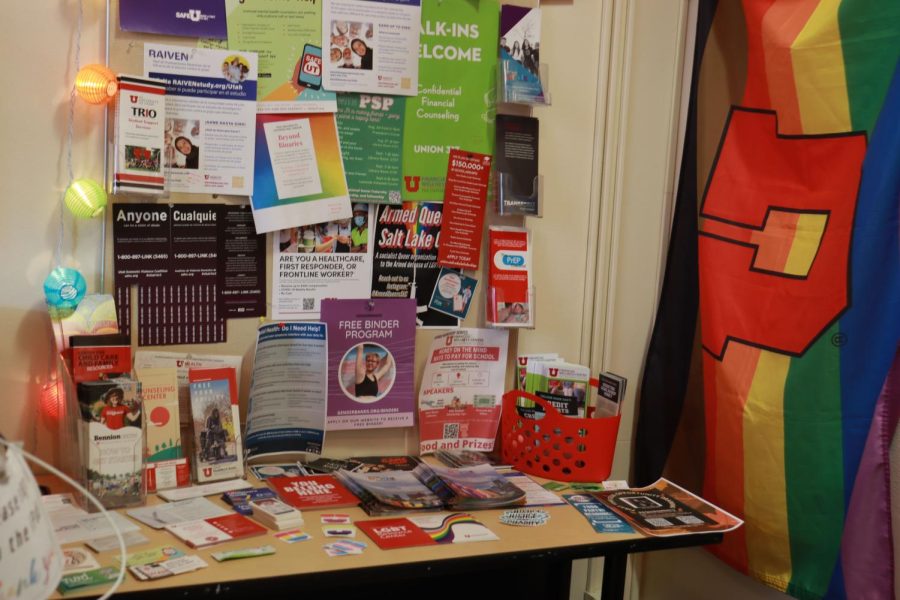
Bulletin of available programs, resources, stickers and related pamphlets at the University of Utah LGBT Resource Center in Salt Lake City on Oct. 24, 2022. (Photo by Sarah Karr | The Daily Utah Chronicle)
Recognizing Violence Against Transgender Individuals in Utah
January 6, 2023
In 2021, 42 of the 134 hate crimes reported in Utah targeted the LGBTQ+ community, up from 22 in 2020, with six offenses targeting transgender people, according to the Salt Lake Tribune.
Nationwide, the LGBTQ+ community has also been targeted by legislation, with the number of anti-LGBTQ+ bills skyrocketing in recent years. State lawmakers proposed a record 238 bills in 2022 that would limit the rights of LGBTQ+ Americans, according to NBC. About half of them target transgender people specifically.
University of Utah student and Armed Queers organizer Ermiya Fanaeian said, “The rhetoric really promotes and exacerbates … the mass amount of violence that we face.” She added that transphobic rhetoric makes people feel like it is acceptable to behave violently toward transgender people.
Recent Incidents
In August, a drag show hosted by Tea Zaanti, a local tea and wine cafe, faced backlash when a young girl joined a performer on stage to dance and sing along to a Disney song. According to the Salt Lake Tribune, the shop owners, Scott and Becky Lyttle, were called “child abusers, groomers and disgusting perverts.”
Fanaeian said there is a constant Puritan fear-mongering created around drag shows and an idea of, “Oh no, if we accept these people in our communities they are going to come after our children.”
It’s politically motivated rhetoric and is often followed by laws to ban the expression of queer and transgender people at drag shows and other events, she added.
Tea Zaanti faced an onslaught of negative comments on Google Reviews and Yelp. Some comments even suggested the girl be taken away from her parents.
At the U, two student attendees at a Recognized Student Organization meeting were reported for using homophobic slurs. According to the report, a student said one of his reasons for joining the group was to “bring the gospel to the liberals and the f***.” Another student at the meeting repeated the slur in response to LGBTQ+ community members wanting to be addressed by their correct pronouns.
Fanaeian said the U has a long way to go in providing material support for trans individuals.
“It’s about a lot more than diversity campaigns, and it’s about a lot more than just pronoun events, more than coloring the block U rainbow a couple of times a year,” she said. She added that in terms of providing health care, the U needs to provide free housing for escaping domestic violence and hold their police officers accountable when they don’t do anything to protect from domestic-based, gender-based violence.
Transphobia within higher educational institutions is not unheard of, Fanaeian said.
“BYU, for a long time, the students there have been struggling against the institutionally permitted discrimination against queer and trans people,” she said.
At the U, she said students have been struggling against right-wing clubs that are allowed to stoke transphobic rhetoric. She said students need to show mass solidarity so “those individuals and those bigoted ideologues understand that this kind of rhetoric is not to be allowed and it’s not to be agreed upon by our collective.”
Legislation
In October, the Utah legislative committee advanced a proposal that would deny gender-affirming surgery for minors. According to the Salt Lake Tribune, the bill would allow for surgeries of medical necessity, but not for those diagnosed with gender dysphoria. The bill will be proposed in the 2023 legislative session, which begins in January.
“We’ve seen far too many young people take their lives because they did not have access to this care,” Fanaeian said.
In March, Utah passed a bill banning young transgender athletes from competing in girls sports. That law, however, is currently on hold after a judge granted an injunction in August due to pending litigation.
Fanaeian said this lawmaking “makes it seem as though we’re simply something to be debated over.”
She added right-wing lawmakers are shaping a negative and propagandist view of transgender individuals, which increases individual, gender-based and state violence against members of the community.
Resources
The LGBT Resource Center on campus provides help and support to all members of the LGTBQ+ community. Coordinator of Queer and Trans Students of Color Initiatives Olga Rodriguez said, “We’re just here to help be an advocate and create space for queer students on campus.”
The resource center has several events and groups that trans individuals can participate in.
Rodriguez said the Beyond Binaries group is put on by the University Counseling Center and is a space where students can “see and feel some gender euphoria within that group and be euphoric with themselves.”
The LGBT Resource Center hosts Pride Week at the U. The next Pride Week will be held from March 27 to April 1 of next year. Students can learn about the history and culture of the LGBTQ+ community in a welcoming environment.
The LGBT Resource Center can also help with name or pronoun changes on Canvas, Campus Information Systems, attendance rosters and diplomas.
“I think that the most important thing is just to make sure you have a community, you’re wanted in this world,” Rodriguez said.
For on-campus resources and support, visit the LGBT Resource Center and the University Counseling Center. For trans-peer crisis support, call the Trans Lifeline Hotline at 877-565-8860. For LGBTQ+ crisis counselor support, call the Trevor Project Hotline at 1-866-488-7386.


